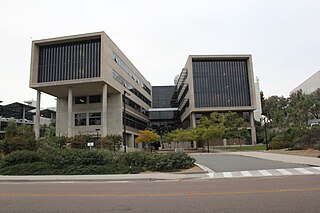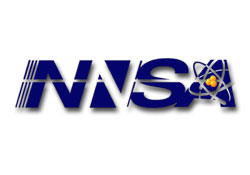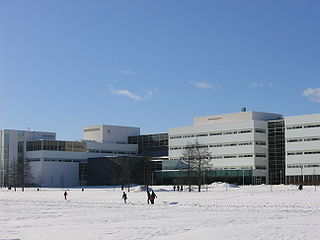
The San Diego Supercomputer Center (SDSC) is an organized research unit of the University of California, San Diego (UCSD). SDSC is located at the UCSD campus' Eleanor Roosevelt College east end, immediately north the Hopkins Parking Structure.
Computational science, also known as scientific computing or scientific computation (SC), is a rapidly growing field that uses advanced computing capabilities to understand and solve complex problems. It is an area of science which spans many disciplines, but at its core, it involves the development of models and simulations to understand natural systems.

The Advanced Simulation and Computing Program is a super-computing program run by the National Nuclear Security Administration, in order to simulate, test, and maintain the United States nuclear stockpile. The program was created in 1995 in order to support the Stockpile Stewardship Program. The goal of the initiative is to extend the lifetime of the current aging stockpile.

The Courant Institute of Mathematical Sciences is the mathematics research school of New York University (NYU), and is among the most prestigious mathematics schools and mathematical sciences research centers in the world. Founded in 1935, it is named after Richard Courant, one of the founders of the Courant Institute and also a mathematics professor at New York University from 1936 to 1972, and serves as a center for research and advanced training in computer science and mathematics. It is located on Gould Plaza next to the Stern School of Business and the economics department of the College of Arts and Science.
The University of MichiganSchool of Information (UMSI) or iSchool in Ann Arbor is a graduate school offering baccalaureate, magisterial, and doctoral degrees in informatics and information science.
The School of Engineering and Applied Science (SEAS) at the George Washington University in Washington, D.C. is a technical school which specializes in engineering, technology, communications, and transportation. The school is located on the main campus of the George Washington University and offers both undergraduate and graduate programs.
Engineering mathematics is a branch of applied mathematics concerning mathematical methods and techniques that are typically used in engineering and industry. Along with fields like engineering physics and engineering geology, both of which may belong in the wider category engineering science, engineering mathematics is an interdisciplinary subject motivated by engineers' needs both for practical, theoretical and other considerations outwith their specialization, and to deal with constraints to be effective in their work.

The College of Computing at the Georgia Institute of Technology has roots stretching back to an Information Science degree established in 1964. In 1988, Georgia Tech president John Patrick Crecine elevated the School of Information and Computer Science to become the College of Computing, making Georgia Tech the second university to do so, after Carnegie Mellon University created their School of Computer Science.

Computational science and engineering (CSE) is a relatively new discipline that deals with the development and application of computational models and simulations, often coupled with high-performance computing, to solve complex physical problems arising in engineering analysis and design as well as natural phenomena. CSE has been described as the "third mode of discovery".

Pulchowk Campus, commonly known as Pulchowk Engineering Campus, is one of the five constituent campuses of the Tribhuvan University, Institute of Engineering in Nepal, and is one of the best engineering colleges in Asia. Other four constituent campuses are Thapathali Campus, Paschimanchal Campus, Purwanchal Campus, and Chitwan Engineering Campus. This is the central campus of Institute of Engineering (IOE), situated in Lalitpur metropolitan city. The campus offers bachelor’s degree, master’s degree and doctoral degree programs.
The Oden Institute for Computational Engineering and Sciences is an interdisciplinary research unit and graduate program at The University of Texas at Austin dedicated to advancing computational science and engineering through a variety of programs and research centers. The Institute currently supports 16 research centers, seven research groups and maintains the Computational Sciences, Engineering and Mathematics Program, a graduate degree program leading to the M.S. and Ph.D. degrees in Computational Science, Engineering and Mathematics. The interdisciplinary programs underway at the Oden Institute involve 123 faculty representing 23 academic departments and five schools and colleges. Oden Institute faculty hold positions in the Cockrell School of Engineering, College of Natural Sciences, Jackson School of Geosciences, Dell Medical School and McCombs School of Business. The Institute also supports the Peter O'Donnell, Jr. Postdoctoral Fellowship program and a program for visiting scholars through the J. Tinsley Oden Faculty Fellowship Research Fund. Organizationally, the Oden Institute reports to the Vice President for Research.
The Advanced Learning and Research Institute (ALaRI), a faculty of informatics, was established in 1999 at the University of Lugano with the mission of promoting research and education in embedded systems. The Faculty of Informatics within very few years has become one of the Switzerland major destinations for teaching and research, ranking third after the two Federal Institutes of Technology, Zurich and Lausanne.

The MIT School of Engineering (SoE) is one of the five schools of the Massachusetts Institute of Technology, located in Cambridge, Massachusetts, United States. SoE has eight academic departments and two interdisciplinary institutes. The School grants SB, MEng, SM, engineer's degrees, and PhD or ScD degrees. As of 2019, the Dean of Engineering is Professor Ian Waitz. The school is the largest at MIT as measured by undergraduate and graduate enrollments and faculty members.

The Agora Center is a separate institute at the University of Jyväskylä in Central Finland. By its nature, the Agora Center is interdisciplinary and networked. Its purpose is to conduct, coordinate, and administrate top-level research and development that relates to the knowledge society and which places emphasis on the human perspective. The research and development is conducted in the form of fixed-period projects in cooperation with the University of Jyväskylä’s other faculties and separate institutes, businesses, the public sector and other relevant parties. The Agora Center also promotes researcher training through its various research projects. One of the core missions of the Agora Center is to effectively combine research and development with education. The project staff includes a high number of students and post-graduate students.
The Morgridge Institute for Research is a private, nonprofit biomedical research institute in Madison, Wis., affiliated with the University of Wisconsin–Madison. The institute works to improve human health by conducting, enabling and translating interdisciplinary biomedical research. Research in regenerative biology, virology, medical devices and core computational technology is currently underway.

The College of Engineering and Physical Science (CEPS), is one of seven faculties – referred to as “colleges” – at the University of Guelph in Ontario, Canada. CEPS operates on the University of Guelph main campus, one of four across Ontario, and has one of the largest faculty, staff, and student populations of the seven colleges at U of G.
Computational astrophysics refers to the methods and computing tools developed and used in astrophysics research. Like computational chemistry or computational physics, it is both a specific branch of theoretical astrophysics and an interdisciplinary field relying on computer science, mathematics, and wider physics. Computational astrophysics is most often studied through an applied mathematics or astrophysics programme at PhD level.

Kharazmi University is a major public research university in Iran, named after Khwarizmi (780-850c), Persian mathematician, astronomer and geographer, offering a wide range of undergraduate and postgraduate programs in a variety of disciplines. Kharazmi University is considered as the oldest institution of higher education in Iran. It was established in 1919 as the Central Teachers' Institute and gained university status as Tarbiat Moallem University of Tehran in 1974. It changed its name to Kharazmi University on January 31, 2012.
The University of California High-Performance AstroComputing Center (UC-HiPACC), based at the University of California at Santa Cruz (UCSC), is consortium of nine University of California campuses and three Department of Energy laboratories. The goal of the consortium is to support and facilitate original research and education in computational astrophysics, and to engage in public outreach and education. The UC-HiPACC consortium sponsors or co-sponsors conferences and workshops and an annual advanced international summer school at a UC campus. It promotes educational outreach to the public, and maintains a website featuring the latest UC news and findings in computational astronomy, a large archive of lecture videos and presentations, and a gallery of supercomputer-generated astrophysics videos and images.

ACM SIGHPC is the Association for Computing Machinery's Special Interest Group on High Performance Computing, an international community of students, faculty, researchers, and practitioners working on research and in professional practice related to supercomputing, high-end computers, and cluster computing. The organization co-sponsors international conferences related to high performance and scientific computing, including: SC, the International Conference for High Performance Computing, Networking, Storage and Analysis; the Platform for Advanced Scientific Computing (PASC) Conference; and PPoPP, the Symposium on Principles and Practice of Parallel Programming.